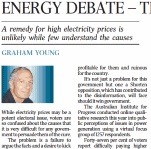 While electricity prices are a potentially potent electoral issue, voters are so confused about the causes, that it will be very difficult for any government to persuade them of the cure.
While electricity prices are a potentially potent electoral issue, voters are so confused about the causes, that it will be very difficult for any government to persuade them of the cure.
A failure to argue the facts, and a desire to kick the renewables can down the road, has caused the problem
The space has been filled by renewable energy lobbyists, who have a vested interest in pushing more unreliable renewables, which are a significant part of the problem, and virtue signalling corporates, who are trying to minimise trouble and maximise profit.
Both have pushed a line which is profitable for them but ruinous for the country.
It’s not just a problem for the current government, but one that a Shorten opposition, which has contributed to the disinformation, might have to face should it win the next election.
Earlier this year we conducted online qualitative research into public perceptions of issues in power generation using a virtual focus group of 1257 respondents.
Forty-seven per cent of voters report difficulty paying higher power prices, so the issue is hot.
The major problem for good policy is that a large proportion of the public believes that high power prices are due to privatisation, enabling corporate greed, and facilitating private companies to game the system. They don’t blame renewables or network prices.
In fact, the causes are multi-factorial and include the increasing use of intermittent renewables, as well as gaming of the system by both private companies, and state governments. More privatisation and less concentration of ownership might have ameliorated these trends, but they are certainly not the cause.
Over the last 10 years household electricity prices have risen 35% in real terms. The recent ACCC report allocates the blame to networks (35%), wholesale electricity prices (22%), environmental subsidies (20%), retail costs (3%), and retail margin (16%).
Renewables aren’t singled out, but they are the whole of environmental subsidies, and some portion of networks and wholesale electricity costs, making them very significant.
Yet 54% of our respondents ranked privatisation as the first or second biggest cost factor, followed by government (47%), profiteering (39%), networks (32%) and only then by renewables (28%).
There are marked differences between voting blocs. 75% of Labor and 72% of Greens voters think privatisation is the biggest problem, while 55% of Liberal and 64% of One Nation/Australian Conservative voters (who we group together) think it is renewables.
But showing how hard the privatisation narrative has bitten, privatisation is accepted as a number one or two problem by 29% of Liberal and 35% of One Nation/Australian Conservative voters. In an area as partisan as this, when you don’t bring the home side with you, it is because you haven’t told them what the play is.
Then things get worse for the government. When you plunge into the qualitative research it is clear that a large number of voters believe that intermittent renewables are the way of the future, and that increasing them in the mix will lead to cheaper prices.
That leads to the sample being split on coal-fired power with 48% wanting coal-fired power stations closed as soon as possible, and 42% opposing this, again with a heavy slant based on voting intention.
Most don’t appear to understand that not only is this not possible, but the power system would be shot to pieces if it did happen.
The split means that keeping coal-fired power stations open might read well in a regional marginal seat like Capricornia, it won’t be popular in an inner city marginal like Brisbane where electors won’t be able to understand what the fuss is about.
Another problem is the popularity of subsidies for renewable energy. They received majority support across the sample of 56% for and 31% against, including 84% and 89% in support from Labor and Greens, and even 24% support from Liberals.
This is not good news for a government that needs to abolish them to stop over-enthusiastic adoption of intermittents pushing prices even higher.
Power prices are not an issue that should ever have become hostage to politics, and they are not one that will be ignored in an election campaign. Climate change is a key concern for left-wing voters, including many journalists, so it will be part of the campaign whether the government likes it or not.
That means that Morrison, and his Energy Minister, Taylor, have to actively engage, even though it may bring short term electoral pain.
The one lever the government has is that most voters are not prepared to pay any more for their electricity in order to meet Paris Accord targets than they do now.
Playing that card will not be easy when a huge number of people believe that renewables are the way to cheaper electricity, and where none of them believes any of the parties, other than their own, knows what it’s doing.